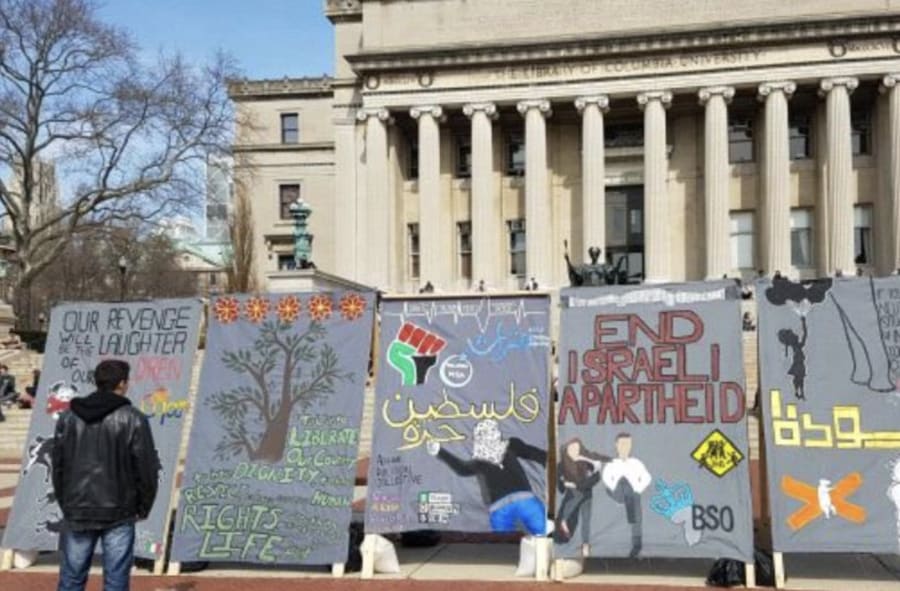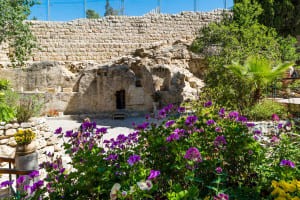Israeli Apartheid Week: What is it and what can we do?

Apartheid is an ugly accusation, and absolutely wrong when it is used to describe Israel. Israeli Apartheid Week, a series of university rallies and lectures that began in 2005 to “raise awareness” about Zionism, will again be crowded with anti-Israel events held this year between March 13–27.
A disturbingly effective disinformation campaign, Israeli Apartheid Week is an offshoot of the Palestinian invention of the Boycott, Divestment and Sanctions (BDS) movement. The simple definition of BDS is “economic warfare against Israel.” It is anti-Semitism in another guise and now forcefully promotes its own kind of apartheid – only against Israeli Jews.
The truth: Israel is not an apartheid nation. It treats its citizens – Jewish, Arab, Druze, Ethiopian, and Christian – with equality. Palestinians are not citizens, but that is by the choice of their own dictatorial leadership, who instead prefer violence and hate-mongering media.
An evil policy, apartheid takes its name from South Africa’s former system of institutionalized discrimination that brutally enforced segregation against non-white citizens. South Africa’s decades-long racial tyranny officially ended on April 27, 1994. However, BDS propaganda and its campus spinoffs have grown for 17 years into Israeli Apartheid Week at more than 200 universities.
The Committee for Accuracy in Middle East Reporting and Analysis (CAMERA) helps us better understand Israeli Apartheid Week. A highly respected, non-partisan source of information, CAMERA monitors media in order to promote accurate, fair reporting about Israel and the Middle East. Among many of their resources is their CAMERA on Campus outreach, where they expose the rampant threats against Jewish students on university campuses. Such threats now overlap against pro-Israel Christian students. This year, for the third time, CAMERA on Campus is running its Apartheid Week Exposed (AWE) campaign. CAMERA coalitions operate on some 80 campuses, including such institutions as Princeton, UC Berkeley, Harvard, Duke, and William & Mary.
The CAMERA coalitions are confronted by an anti-Israel organization called Students for Justice in Palestine (SJP), among others. SJP claims a presence on 200 campuses. The lies are endless: “Israel refused to vaccinate Palestinians. Israel steals Palestinian water. Israel imprisons children. A wall completely surrounds Bethlehem. Israel will not allow Palestinians into their hospitals. Israel turns off electricity in Gaza.”
Threats mark the SJP’s actions to individual students, lobbying university presidents to deny Israeli or conservative speakers on campus, or calling for disruptive demonstrations when they come.
The Institute for the Study of Global Antisemitism and Policy published a report several years ago titled “National Students for Justice in Palestine (NSJP) and the Promotion of Hate and Antisemitism on the University Campus: The Threat to Academic Freedom.” They listed a few quotes from their membership that characterize their animosity. Wrote a member at San Diego State University, “I hope all of you have sweet dreams of slaughtering Zionists.” A member at the University of Texas Dallas posted, “Three words a day to live by. Blame the Jews. #Hitler.” Yet another at New York University wrote, “May Allah not help them and burn them in the hell fire. Let the Jews burn silently.”
Hali Spiegel, CAMERA’s North American campus director, explains: “They depict the State of Israel as a manifestation of pure evil: racist, genocidal, murderous. Worse yet, they pitch this false narrative to students looking to support a just cause. That’s where our campaign comes in. Their lies cannot go unchallenged.”
Student leaders in the CAMERA on Campus coalitions will face opposition in their on-campus efforts to disseminate facts, host expert speakers, and pass out information. Their bravery is inspiring.
Two months before this year’s Israeli Apartheid Week, Bard—a private New York college—launched a new course titled “Apartheid in Israel-Palestine.” Bard’s syllabus includes this description: “This course will examine Israel-Palestine and the crime of apartheid.”
As examples of what sort of events occur during Israeli Apartheid Week itself, the Ireland-Palestine Solidarity Campaign directed some of its branches to hold a Boycott Israeli Goods in stores on March 4 telling shoppers not to buy any Israeli products in Irish stores. In England, to offset the Irish activism, a delegation of Israeli students traveled from Israel to advocate alongside the British CAMERA team in the Apartheid Week Exposed campaign. That group included CAMERA on Campus Israel’s campus advisor, Tom Yohay, who explains, “As Israelis, we have a responsibility to share the truth about Israel. We are calling for dialogue, even if we are confronted with hostility and bigotry, our willingness to sit at the table sends an important message.”
Not to be left behind in disinformation efforts, some American churches are creating their own programming. For example, on March 15, the Methodist Federation for Social Action will present a Zoom panel discussing “Apartheid-Free Communities: Exposing & Resisting Israeli Apartheid, Occupation, and Settler-Colonialism.”
Canadians are joining in—with Buses Against Apartheid rolling down the streets of St. John’s, Newfoundland, throughout March. Three public buses will display big placards on the back of their buses spreading the falsehood: “The State of Israel Practices Apartheid.”
The theme for Israeli Apartheid Week 2023 is “People Against Apartheid.” In its own advertising, BDS is seeking to unite more grassroots organizations including Black Lives Matter. They highlight their versions of “liberation, decolonization, and racial justice” across the world.
The BDS movement—and students, churches, and institutions lured into their way of thinking—claims to promote policies that help the Palestinians. Yet the boomerang effect on the Palestinians is anything but helpful. For example, in 2015 a BDS uproar drove the SodaStream company out of the West Bank—Israel’s biblical heartland. Palestinians were earning better salaries at SodaStream than anywhere else on the West Bank and wanted to work there alongside Jews. Forcing SodaStream to relocate to another part of Israel meant Palestinian workers and families suffered by losing their jobs. It’s estimated that Israeli companies employ around 35,000 or more Palestinians in the biblical heartland, where employees make better salaries working for Israeli companies.
BDS especially targets the biblical heartland, calling Judea and Samaria “occupied” and belonging to Palestinians. The bottom-line motive behind the BDS movement is not peace or even a Palestinian state. It is hatred and destruction. Their goal is to eradicate Israel. The BDS slogan is clear: “From the river to the sea, Palestine will be free!”
We live in an upside-down world described by the renowned prophet Isaiah: “Woe to those who call evil good and good evil, who put darkness for light and light for darkness” (Isaiah 5:20). BDS is putting “darkness for light” as a global stalker not only against Israel itself but infecting students on college campuses. That results in shaping student minds in two ways: either with propaganda and anger or fear and threats to those who subscribe to biblical truth.
We must find ways to constrain the tentacles that are wrapping around students on their campuses. Here are a few practical ways to bless brave students on campuses. Become familiar with CAMERA and support the students standing up for true justice. Post their excellent advocacy on your social media. Passages Israel, a 501(c)(3) Christian organization, has taken more than 10,000 college students for trips to Israel to educate and equip them in pro-Israel advocacy. Camera on Campus and Passages Israel are two excellent ways to contribute to students’ understanding and involvement!
This article originally appeared here and is reposted with permission.

A speaker and consultant, Arlene Bridges Samuels authors the weekly feature column for The Christian Broadcasting Network/Israel on their Facebook and Blog since 2020. Previously she pioneered Christian outreach for the American Israel Public Affairs Committee (AIPAC). Retiring after nine years, she worked part-time for International Christian Embassy Jerusalem USA as Outreach Director for their project, American Christian Leaders for Israel (ACLI) Arlene is an author at The Blogs-Times of Israel, often traveling to Israel since 1990. By invitation she attends the Israel Government Press Office (GPO) Christian Media Summits as a recognized member of Christian media worldwide. Read more of her articles at CBN Israel blog. Arlene and her husband Paul Samuels have coauthored a book, Mental Health Meltdown, illuminating the voices of bipolar and other mental illnesses. On Amazon














